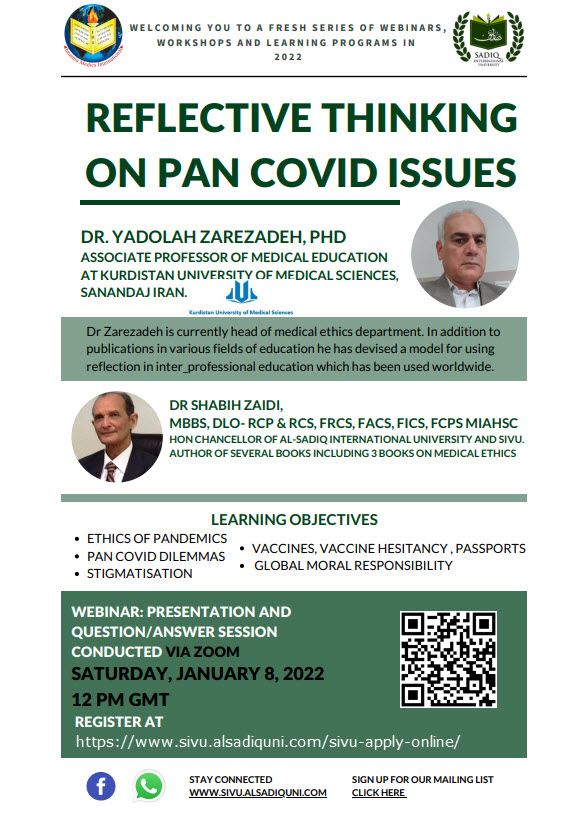
SIVU is excited to start 2022 with the first Webinar on 8th January, followed by a regular series of webinars on medical education and clinical topics.
By Prof. Yadolah Zarezadeh
We, humans, are always naturally busy creating things, thoughts, concepts, emotions, fashions, fictions, and social norms. Nearly two years ago Covid 19 emerged as a pandemic and adversely affected each and every aspect of our lives. In this period of time, we have produced Covid 19’s version of everything including education, travel, festivals, sports, trading, healthcare delivery, social gatherings.
The ‘COVID-19 Pandemic’ as a ‘rare incomprehensible occurrence of the century with an ‘intensely wide-ranging devastation worldwide, has many aspects, dimensions, and issues that require deep reflection to understand. This is a unique phenomenon that deserves reflection to learn about it and unlearn unfavorable assumptions we as humans make instinctively.
In Western Traditions, reflection can be traced back to thoughts and teachings of Greek philosophers such as Socrates, Plato, and Aristotle as a “way of understanding and doing things”. On the other hand, reflection has long been considered as “a way of being and becoming” in Eastern traditions prominent in Islam, Buddhism, and Sophism. In the contemporary philosophy of education, reflection is viewed as a tool to understand the causal relationships between variables in the positivist approach, a way for understanding and interpreting in qualitative approaches, and as an instrument for emancipation and justice in critical social theories.
In this brief presentation, I argue that reflection on Pandemic Covid 19 and all issues related to the pandemic can help us understand what has happened, what has gone wrong, and what could have been much better. Reflection on each issue will result in better preparedness for the future and changing the directions of our actions if required.
I will finally urge scholars, academics, researchers, and authorities all over the world to conduct reflective discussions on issues such as vaccine nationalism, vaccine hesitancy, xenophobia, stigmatization, government accountability and responsibilities, the issue of accountability, the duty to treat when healthcare professionals are at considerable risk and the rich countries and pharmaceutical companies’ moral responsibilities toward less developed countries.
By Prof. Shabih Haider Zaidi
The current pandemic has caused much grief and a huge loss to humanity. It’s impact is bound to last for generations to come. In January 2020, my topic in the SIVU series of webinars was the promised dawn following the development of the vaccine. Now, I wish to discuss the impact of the pandemic through reflective thinking along with Prof Zarezadeh who has a special interest in the subject. The convoluted general guidance for the allocation of medical resources has prevented effective care. Stressed health care professionals made many traumatic decisions under stressful conditions. This, combined with the additional tensions and rising costs wrought by a pandemic, risked increasing preventable deaths.
The formulation of long term guidelines is therefore necessary.
Such is the objective of the discussion of this webinar, deciding how NHS hospitals ( and the health services in other countries) should ration materials amongst patients requires the analysis and evaluation of multiple ethical and practical facets, suggested by prominent scholars and institutions. This entails exploring the applications of Deontology, Utilitarianism, Egalitarianism, Virtue based ethics random selection, the reallocation of supplies already in use, and duty-based allocation with respect to the Four Pillars of Medical Ethics and the founding principles of the NHS. Balancing the moral and instrumental impacts result in the most efficient and ethical amalgamation of these theories. This webinar identifies and argues for an advisable approach, which would prioritise essential workers and the elderly, conduct decision-making in randomized multi-disciplinary teams whilst implementing a QALY system, and ensure palliative care for those who cannot be treated. Special emphasis will be laid upon the role of vaccines in saving lives and the damage caused by anti vaccine groups. Equitable and fair distribution of global resources is essential to save humanity from the present and possible future disasters of similar nature.
Shabih Zaidi
FRCS .


how to get my certifcate please